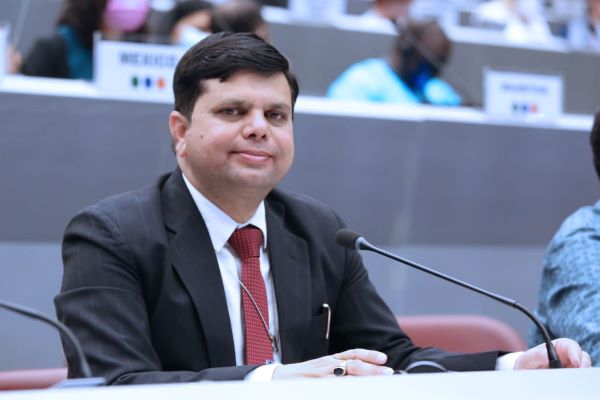The international conventions to which India is a signatory member are: Stockholm Convention; Rotterdam Convention; Chemicals Weapons Convention; and SCOMET

The Indian chemical industry is one of the most important components of our economy and contributes around 7% to India's GDP. Amidst the global pandemic, the chemical industry has been one of the only few sectors to have not only survived it but also grown by leaps and bounds. India is the 6th largest producer of chemicals in the world and 3rd in Asia has aided the Indian chemical industry which is now set to capitalize on forthcoming opportunities. India is 4th largest producer and exporter of agrochemicals and 2nd largest producer and exporter of dyestuffs globally. The present market size is around US $212 billion and the sector has the potential to reach US $300 billion by 2025.
International Conventions
The international conventions to which India is a signatory member are: Stockholm Convention; Rotterdam Convention; Chemicals Weapons Convention; and SCOMET Items.
Stockholm Convention: The Stockholm Convention is an International Environmental Treaty on Persistent Organic Pollutants (POPs). It was signed on 22nd May, 2001 in Stockholm and was effective from 17th May, 2004. The convention aims to protect human health and the environment from the effects of persistent organic pollutants (POPs). The Government of India had ratified the Stockholm Convention on 13th January, 2006 as per Article 25(4).
Rotterdam Convention: The Rotterdam Convention is a Multilateral Treaty to promote shared responsibilities in relation to importation of hazardous chemicals. It involves open exchange of information and calls on exporters of hazardous chemicals to use proper labelling, including directions on safe handling of chemicals. The objectives of the convention include two key provisions, namely the Prior Informed Consent (PIC) Procedure and Information Exchange.
Chemicals Weapons Convention: Chemical Weapons Convention is a universal non-discriminatory, multilateral, disarmament treaty which bans the development, production, acquisition, transfer, use and stockpile of all chemical weapons. India signed the treaty at Paris on the 14th day of January 1993. India enacted the Chemical Weapons Convention Act, 2000. The Department of Chemicals & Petrochemicals (DCPC) is the administrative Department of CWC Act, 2000. It is in force in the country with effect from 1st July 2005. DCPC also notified the CWC Appeals Rules, 2005 in July, 2005 and CWC Rules, 2016 in August 2016.
SCOMET: In Foreign Trade Policy, dual-use items have been given the nomenclature of Special Chemicals, Organisms, Materials, Equipment and Technologies (SCOMET). Export of dual-use items and technologies under India’s Foreign Trade Policy is regulated. Export of dual-use items and technologies is either prohibited or is permitted under a license export policy relating to SCOMET items is given in Appendix 3 of Schedule 2 of ITC (HS) Classification.
Global Scenario for Regulations
The European Union (EU) initiated the process of regulating the chemical substances with the legislation for Registration, Evaluation, Authorization and Restriction of Chemicals (REACH) in 2006. Its main aim is to understand the possible human and ecological hazards of chemicals in the market and to ensure that any major threat is anticipated as well as prevented.
Major developed countries like the USA, Canada, Japan, Australia and also many developing countries such as Taiwan, South Korea, Philippines, and Thailand, have followed suit and established REACH-like regulation in their countries.
Indian Scenario for Regulations
India has notified the “Manufacturer, Storage and Import of Hazardous Chemical Rules, 1989” under the Environment Protection Act, 1986 under which 684 chemicals have been identified as hazardous chemicals and the conditions for their safe handling, audit, reporting, emergency handling by users, have been prescribed.
India has also notified the Central Insecticides Act, 1968 under which pesticides technical and pesticides formulations have been approved and registered, while certain pesticides have been banned for use or imports and certain pesticides have been permitted under restricted use.
India has also notified the Drugs & Cosmetics Act, 1940 under which the import, manufacture and distribution of drugs in India are regulated.
India has also notified the Bureau of Indian Standards (BIS) Act, 2016. The Bureau of Indian Standards (BIS) Act 2016 establishes BIS as the National Standards Body of India. The manufacturers and importers have to comply with BIS (Conformity Assessments) Regulation 2018. The Standards are made mandatory under section 16 and Section 25 (3) of the Bureau of Indian Standard Act, 2016. Under Section 16 of the act, the Standards are made as mandatory in the public interest or for: Protection of human, animal or plant health; Safety of the environment, or; Prevention of unfair trade practices, or; and National Security.
Growth Enablers
The Government's focus is on strengthening the sector by supporting Industry with the development/adoption of new technologies and techniques. Government has approved four Petroleum Chemicals & Petrochemicals Investment Regions (PCPIRs) to give a boost to the production of chemicals and petrochemicals.
An Advisory Forum for Chemicals & Petrochemicals Sector has been constituted and its role is to provide a platform to the industry associations for raising their issues and concerns. This will help to boost the ‘Make in India’ initiative by promotion of investments in the chemicals & petrochemicals sector to meet growing domestic demand and promote exports.
The government is also exploring the possibilities to set-up chemical parks which will be segment specific and on a cluster based approach. The said parks will be designed in plug-n-play mode of operations.
(The views of the author in the article are personal.)
Subscribe to our newsletter & stay updated.